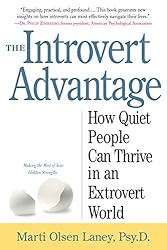How to thrive in an extrovert world
Nothing is wrong with me, I’m just introverted. I began to understand my need to be alone to recharge my batteries. It’s a great relief to stop trying to be who you are not.
Takeaway – My list of notes and quotes from the book
- Since Introverts often don’t talk about what they are thinking, they receive no feedback to tell them and gain perspective about how much they already know.
- Introverts draw energy from their internal world of ideas, emotions and impressions.
Refueling
- Introverts are energized by the internal world, by ideas, impressions, and emotions. They need a quiet reflective place where they can think things through and recharge themselves.
Stimulation
- Attempt to regulate experiences of overstimulation through limiting external input.
- Introverts enjoy complexity when they can focus on one or two areas, without pressure. But if they have too many projects, they vastly feel overwhelmed. Introverts like depth and will limit their experience but feel each of them deeply. They absorb information from the outside environment and then reflect in it and expand it. You can learn to store up energy, and thereby have a reserve to enable you to use your less naturale side.
- Function outside your natural niche, it will consume extra energy without creating any new energy.
- Famous Introvert: Abraham Lincoln
- If nature intended us to talk more than listen, she would have given us two mouths and one ear.
Learning to manage shame and guilt
- If you feel guilty, try to find out if you really hurt someone. If you hurt someone, apologize sincerely, then move on.
- The main antidote to shame is self esteem.
- You can estimate your energy level each day. Then you can adjust your day or week or life in order to maintain a balance of supply and demand.
- Some questions to ask yourself to clarify your energy level:
- What is my energy level? Alert? Fuzzy? Brain dead?
- What is my body energy level? Pooped? Pert? Peppy?
- Do I feel overstimulated or understimulated?
- What do I have to do today? What is optional?
- Can I add anything if I have more energy?
- Can I put off if I’m running on low fuel or empty?
- Can I put extra breaks in my schedule?
- Do I need time alone?
- What kind of alone time do I need (e.g. reading, napping, staring out of the window, sitting quietly inside, listening to music, watching TV)?
- Could I benefit from some external stimulation (seeing friends, going to a museum)?
- What do I need today?
- “Within you there is a stillness and a sanctuary to which you can retreat any time and be yourself“ – Hermann Hesse
The emerging brainscape
- Temperament varies among individuals and appears early in life.
- In China the balance was based upon the five forces of energy called chi – wood, fire earth, metal and water.
- Written words use different pathways in the brain, which seems to flow fluently for many introverts. The Introvert’s blood flowed to the parts of the brain involved with internal experiences like remembering, solving problems and planning. Ongoing dialogue with themselves. They need to reach back into long-term memory to locate information. This requires reflection time without pressure. They also need to give themselves physical space to let their feelings and impressions bubble up.
- The dominance of the long acetylcholine pathway means that introverts may not be aware of their thoughts unless they write or talk about them.
- Can forget things they know very well.
- Might stumble around when explaining their job or temporarily forget a word they want to use.
- The activation of the parasympathetic nervous system means that you may need to regulate protein intake and body temperature.
Play to your strengths
- Left-brained introverts may be more comfortable living life as an intro, they may not be as conflicted over spending time alone, they are more verbal and logical. They take in new material in sequences, they learn by repetition and understanding principles, main points, and theoretical ideas, they value the written word.
Switching specs
- After we have a solid understanding of our own way of looking at things, we can begin to comprehend our partner’s.“I wonder what’s it like for you? Tell me what you liked about it.”
- Practise saying anything that pops into your mind.
- Let your partner know if you need downtime.
- How do you want grow your relationship?
Anticipating
- Many Intros tend to foreshadow. Tell yourself, “I don’t need to think about that”, if you keep dwelling on something embarrassing.
5 Guerilla Socialising Tactics
- The Sea Anemone
I am much more comfortable sitting down, anchored to my rock, than I am wandering around the room. Sure enough, sooner or later some folks drift by. - Act AS IF
It’s a way to try on a new skill or a new role until it becomes a part of you. Fake it till you make it. Picture yourself looking poised. Smile at strangers. Make eye contact with someone and then join their group. In a few minutes move on to another group. - Prob job
Snapping pictures at social gatherings. - A Friendly Face
Eye contact increases stimulation. Look intensively at someone to increase the impact of what you are saying. - Small Talk
Openers: The best entry line is to ask a question about the topic under discussion. Hi, I’m x, isn’t this a beautiful home. How do you know the host?
Sustainers: Keep the conversation going. Did you see that movie? I wonder why that show is so popular. What do you think?
Transitions: Steer the talk onto safer shore when you mentioned your vacation. “I was wondering where you went.”
Closers: Standing chitchat groups last an average of 5-20 minutes, when you are ready to leave it’s important to say something, “Oh, there is Sam, I’ve got to give him a quick message.”
- Remind yourself everyday of what you bring to the party: concentration, loyalty, thoughtfulness, persistence, tough-mindedness, creativity, originality, foresight and a wide range of knowledge.
- Remember not to take the extrovert’s more aggressive style personally.
Personal pacing
- How much better we would feel, if we slowed down.
- Plan what you can do out of what you must do.
- 3 days full of work, 4 days off.
- Making tiny microsteps is the way introverts work best.
- Helping people grow.
- If you are not doing something on your list, consider whether you really want to do it. Is it something you think you should do, or something someone else thinks you should do?
Personal parameters
- Make sure you have adequate borders.
- “I can complete the first part of the report this afternoon.”
- Connect your low energy to your lack of private time.
- Are you doing something for another person automatically without checking in with yourself to see if that’s really what you can or want to do?
- If you want to think about a response say “maybe”.
Getting the night munchies
- Since introverts use their long-term memory more often than extroverts, they need to sleep on decisions in order to benefit from the way they process information.
- Give yourself time and space:
- let yourself think of options – there are almost always more than two
- that sounds good, let me think for a minute
- trust your brain
- imagine the consequences of saying yes, would it really be that horrifying?
Harnessing your energy
- 1. Law of Thermodynamics: energy can be transformed but it cannot be created or destroyed.
- 2. Law of Thermodynamics: when we use or transform energy it becomes disorganized and we can’t reuse it until it can be organized again.
- Convert scattered energy into composed energy: exercise, nourishing foods, meditation, yoga, massage, vacation.
Rekindling energy reserves
- a fifteen minute break
- close your eyes, think of a beach
- take a short walk
- drink a cup of tea
- read a magazine article
- Compose yourself by taking breaks.
- How we get out of bed influences how we feel all day.
- Increase your alert energy with deep breathing exercise: breathe in deeply through nose, hold for four, exhale through mouth count of six.
Small changes have big payoffs
- Remaining too comfortable causes us lose aspects of our personalities.
- When you base your confidence on who you are, instead of what you accomplish, you have created something that no one or no circumstances can ever take away from you.
- It’s the ability to be determined, curious, tolerant of mistakes, and kind to yourself as you learn new skills. No one can take your persistence or any of these qualities away from you.
- Satisfaction from a big promotion lasts, at the most, about 6 month.
- It is the voice in your head, not something that actually happened.
3 reasons why you should read the book
- If you sometimes feel overwhelmed by Extroverts this book really lifts you up.
- You need a reminder of your personal qualities.
- You want to be inspired and promote your Intro talents.


Schreibe einen Kommentar